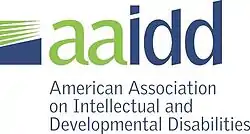American Association on Intellectual and Developmental Disabilities
The American Association on Intellectual and Developmental Disabilities (AAIDD) is an American non-profit professional organization concerned with intellectual disability and related developmental disabilities. AAIDD has members in the United States and more than 50 other countries.
 | |
| Abbreviation | AAIDD |
|---|---|
| Founded | 1876 |
| 06-0636098[1] | |
| Legal status | 501(c)(3)[1] |
| Purpose | To promote progressive policies, sound research, effective practices, and universal human rights for people with intellectual and developmental disabilities. |
| Location |
|
| Laura Lee McIntyre, PhD[3] | |
| Margaret Nygren, EdD[3] | |
Revenue (2017) | $4,252,498[4] |
| Expenses (2017) | $4,100,667[4] |
Employees (2017) | 18[4] |
Volunteers (2017) | 20[4] |
| Website | www |
Formerly called | Association of Medical Officers of American Institutions for Idiotic and Feebleminded Persons, American Association for the Study of the Feebleminded, American Association on Mental Deficiency, American Association on Mental Retardation |
History
AAIDD was founded AAIDD in 1876 and is headquartered in Silver Spring, Maryland,[5] a suburb of Washington DC. Its first president was Édouard Séguin ][6]
The AAIDD is the oldest professional association concerned with intellectual and developmental disabilities. AAIDD advocates for the equality, dignity, and human rights of people with intellectual and developmental disabilities, and for their full inclusion and participation in society.
The name of the association[7] has changed five times in its history, reflecting the changes in thinking about the condition known today as intellectual disability:
- 1876: Association of Medical Officers of American Institutions for Idiotic and Feebleminded Persons
- 1906: American Association for the Study of the Feebleminded
- 1933: American Association on Mental Deficiency
- 1987: American Association on Mental Retardation
- 2007: American Association on Intellectual and Developmental Disabilities
Mission and goals
The AAIDD promotes progressive policies, sound research, effective practices, and universal human rights for people with intellectual and developmental disabilities.[8]
The association's goals are to:[8]
- Enhance the capacity of professionals who work with individuals with intellectual and developmental disabilities.
- Promote the development of a society that fully includes individuals with intellectual and developmental disabilities.
- Sustain an effective, responsive, well managed, and responsibly-governed organization.
Publications
The AAIDD publishes three peer-reviewed journals, books, and evidenced-based assessment tools.
Journals
The AAIDD encourages a diversity of contributions from different traditions of inquiry and disciplines;[9] all papers must meet the journals' criteria for rigor and peer review to be considered for publication.
- American Journal on Intellectual and Developmental Disabilities (AJIDD). Established in 1896, AJIDD is a multidisciplinary journal for reporting original contributions of the highest quality on intellectual disability, its causes, treatment, and prevention.
- Intellectual and Developmental Disabilities (IDD). Established in 1963, IDD is a multidisciplinary journal of policy, practices, and perspectives. As a journal with an applied focus, IDD provides a forum for the dissemination of rigorously reviewed, actionable information that is relevant to emerging policies, innovative practices, and transformative concepts.
- Inclusion. Established in 2013, Inclusion is a multidisciplinary journal that provides a multidisciplinary forum for the presentation and discussion of evidence-based interventions and strategies that promote the full inclusion of people with intellectual and developmental disabilities in society.
Books
The AAIDD publishes essential books and tools for professionals and others in the field of intellectual and developmental disabilities. The organization's most well-known book is its definition manual, first published in 1910 and now in its 11th edition: Intellectual Disability: Definition, Classification, and Systems of Support.[10][11]
Assessment tools
The AAIDD is the publisher of the Supports Intensity Scales (SIS), assessment tools that evaluate the practical support requirements of people with intellectual disability. There is a children's version (SIS-C) and an adult version (SIS-A). Both versions measure support requirements in regard to life activities as well as behavioral and medical needs. The assessment is done through an semi-structured interview with those who know the person well, and can include the person with the disability who is being assessed.
The SIS-A and SIS-C measure support needs in multiple areas of daily life, including home living, community living, lifelong learning, employment, health and safety, social activities, and protection and advocacy. Assessors rate each life activity according to the frequency of support (e.g., none, at least once a month), amount of support (e.g., none, less than 30 minutes), and type of support (e.g., monitoring, verbal gesturing) that a person requires. An overall Supports Intensity Level is determined based on the Total Support Needs Index, which is a standard score generated from scores on all the items tested by the scale.[12]
Education
As the oldest professional organization in the field of intellectual and developmental disabilities,[13] AAIDD offers educational opportunities to the global disability community,[14] including an annual conference, e-learning, webinars, and professional research and exchange in countries outside the US.
The association's YouTube channel provides short educational videos on topics related to intellectual and developmental disabilities.[15]
References
- "American Association on Intellectual and Developmental Disabilities". Tax Exempt Organization Search. Internal Revenue Service. Retrieved October 10, 2019.
- "Contact Us". American Association on Intellectual and Developmental Disabilities. Retrieved October 21, 2019.
- "Governance". American Association on Intellectual and Developmental Disabilities. Retrieved October 10, 2019.
- "Form 990: Return of Organization Exempt from Income Tax". American Association on Intellectual and Developmental Disabilities. Guidestar. December 31, 2017.
- http://www.aaidd.org
- "The American Association on Intellectual and Developmental Disabilities (AAIDD) Diagnostic Criteria for Intellectual Disability". Retrieved April 9, 2019.
- "About AAIDD". aaidd.org. Retrieved May 23, 2019.
- "Mission". aaidd.org. Retrieved April 9, 2019.
- "Journals". aaidd.org. Retrieved May 23, 2019.
- Intellectual disability : definition, classification, and systems of supports. American Association on Intellectual and Developmental Disabilities. (11th ed.). Washington, DC: American Association on Intellectual and Developmental Disabilities. 2010. ISBN 9781935304043. OCLC 435422270.CS1 maint: others (link)
- "error404". aaidd.org. Retrieved May 23, 2019.
- "Product Information". aaidd.org. Retrieved May 23, 2019.
- https://www.aaidd.org/intellectual-disability
- "Education". aaidd.org. Retrieved May 23, 2019.
- "aaiddvideos". YouTube. Retrieved May 23, 2019.